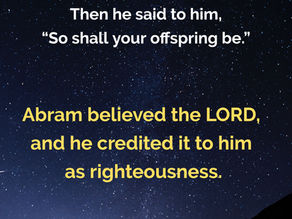Deuteronomy 32:45-47 - A Book Unlike Any Other
- Joe Steenholdt
- Feb 20, 2024
- 4 min read
The Bible is thorough in matters of faith and worship.
Deuteronomy 32:45–47 (NIV)
CONTEXT: Moses is giving his final words to the Israelites. He has come to the end of his life, and the people are just about to cross into the Promised Land.
45 When Moses finished reciting all these words to all Israel, 46 he said to them, “Take to heart all the words I have solemnly declared to you this day, so that you may command your children to obey carefully all the words of this law. 47 They are not just idle words for you—they are your life. By them you will live long in the land you are crossing the Jordan to possess.”
Listen to passage & devotional:
Belgic Confession of Faith, Article 7: The Sufficiency of Scripture
We believe
that this Holy Scripture contains
the will of God completely
and that everything one must believe
to be saved
is sufficiently taught in it.
For since the entire manner of service
which God requires of us
is described in it at great length,
no one—
even an apostle
or an angel from heaven,
as Paul says—
ought to teach other than
what the Holy Scriptures have
already taught us.
For since it is forbidden
to add to or subtract from the Word of God,
this plainly demonstrates
that the teaching is perfect
and complete in all respects.
Therefore we must not consider human writings—
no matter how holy their authors may have been—
equal to the divine writings;
nor may we put custom,
nor the majority,
nor age,
nor the passage of time or persons,
nor councils, decrees, or official decisions
above the truth of God,
for truth is above everything else.
For all human beings are liars by nature
and more vain than vanity itself.
Therefore we reject with all our hearts
everything that does not agree
with this infallible rule,
as we are taught to do by the apostles
when they say,
“Test the spirits
to see if they are of God,”
and also,
“If anyone comes to you
and does not bring this teaching,
do not receive him
into your house.”
Summary
The first five books of the Bible—Genesis, Exodus, Leviticus, Numbers, and Deuteronomy—are attributed to Moses. Exodus through Deuteronomy covers his lifetime and the most significant redemptive events in Israel’s history when God brought His people out of slavery in Egypt. When Moses was born, the Israelites had spent 400 years in Egypt after the time of Joseph. As time went on, the leaders of Egypt forgot their significance, and the Hebrew people suffered under harsh slave labor and violence. God did not forget His people and had a plan.
As the story unfolds from Exodus onward, God gives His people many laws and ceremonies to live by. He has to teach them what it is like to be in a covenant relationship with their God and how Abraham was told many years before to “walk before God” (Gen. 17:1).
A familiar African American spiritual song, Go Down Moses, repeats the famous line told to Pharaoh over and over through the plagues: “Let my people go!” A second part of this phrase is also joined with this request over and over, giving the purpose for the Israelites’ freedom: “so that they may worship me in the wilderness.” Some English translations use “serve me in the wilderness” (Ex. 7:16; 9:1; 10:3). God’s people would be saved and then shown how to serve God in response. All the rules and rituals in these first five books, the Torah, would thoroughly describe how God would be worshiped.
Dig Deeper
Deuteronomy 32:45–47 is Moses’s summary speech near the end of these first five books. These were not cold codified laws regulated for lawyers, judges, and legal experts, but were living Words for a flourishing life with the living God. At the end of Deuteronomy, the Israelites were ending their long journey through the desert and about to embark into the promised land. God provided all these words to live in a kingdom freely serving Him as their king.
Article 7 of this Confession of Faith also speaks to the sufficiency of Scripture in its thoroughness and length, “For since the entire manner of service which God requires of us is described in it at great length.” Service can be translated as “worship” here, just like in Exodus 7:16.
The Bible is complete in that it gives us knowledge about God and our faith, but it's also sufficient in how it teaches us to serve Him in response to His saving grace. This is primarily what we do in worship on the Lord's Day, and why your church likely calls it a “worship service.”
This is also why many worship services are centered around hearing, singing, and praying God’s Word together. The Bible is sufficient to guide us in worshiping our God as we gather as His people. God’s Word, proclaimed from Scripture, should not be a cold, rote ritual, because it's living and active proclamation that cuts to our core (Heb 4:12).
ACKNOWLEDGE WHO GOD IS: The Living and Holy God Who deserves all of our worship;
ALIGN YOUR LIFE WITH GOD'S WILL: Pray that you will be sanctified by the truth, for God’s Word is truth and life (John 17:17)
ASK GOD FOR WHAT YOU NEED:
Read the New Testament in a year! Today: Acts 20




















Comments